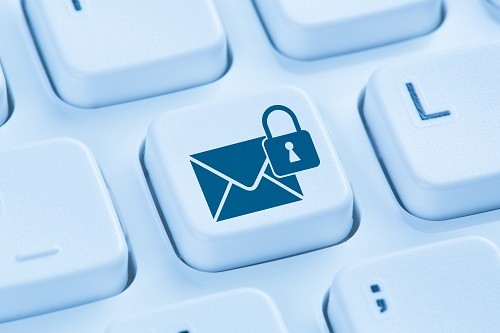Knowledge Base
Your Email Isn’t as Secure as You Think: What You Need to Know
![]() Email has become one of the most popular forms of communication today. According to Statista, an estimated four billion email users worldwide are expected to grow to 4.6 billion by 2025. On average, as of 2021, approximately 319.6 billion emails are sent daily, while 95% of people aged 24-44 have an email account.
Email has become one of the most popular forms of communication today. According to Statista, an estimated four billion email users worldwide are expected to grow to 4.6 billion by 2025. On average, as of 2021, approximately 319.6 billion emails are sent daily, while 95% of people aged 24-44 have an email account.
Email communication is convenient and efficient, but it can come with risks if the proper security measures are not taken. It is important to remember that email is not a secure form of communication and should never be used to send private information. With the threat of cybercrime and hackers targeting unsuspecting users, emails are particularly vulnerable to being intercepted by malicious third parties. As such, everyone needs to exercise caution when emailing confidential data.
Emails often pass through multiple servers from sender to receiver, leaving them open to potential hacks or data breaches. To protect against unauthorized access, users should use secure passwords for their email accounts and avoid clicking on links or downloading attachments from unknown or suspicious senders.
As a precaution, users should delete any emails containing sensitive data after being viewed so that third parties cannot access them maliciously.
Types of protected data
 |
Personal Identifiable Information (PII) related to emailing is the data that can be used to identify an individual. This could include email addresses, passwords, IP addresses, contact information, and other details that could be used to track a person's online activity. Protecting PII when using email communication is essential as cybercriminals use increasingly sophisticated methods to access confidential information. Using strong passwords and avoiding clicking on suspicious links or attachments that may contain malicious software is crucial. Additionally, users should be vigilant in monitoring their accounts for unusual activity, such as unexplained emails sent from their accounts or emails received from unknown sources.
Protected Health Information (PHI) is any information related to the health status, medical history, care provision, or payment for healthcare services of an individual. This includes data such as a patient's name, Social Security number, address, date of birth, diagnosis code, procedure codes, health insurance policy numbers, lab results, and other information about a person’s physical or mental health. As PHI is considered personal and sensitive information, protecting it from unauthorized access and use is important.
Under the Health Insurance Portability and Accountability Act (HIPAA), healthcare providers are required to ensure the security of PHI. Therefore, all data must be secured with appropriate technical safeguards like encryption and authentication procedures. Additionally, access to PHI should be restricted to only those who need it to provide care or administer benefits. Furthermore, all electronic PHI must be monitored for potential breaches to detect unauthorized access attempts. It is essential for healthcare providers and patients to take proper steps toward protecting PHI to ensure their privacy and security when communicating via email or other digital platforms.
Payment Card Industry (PCI) data is information about payment card transactions. It includes any data stored, processed, or transmitted during a card transaction. This includes customer account numbers, expiration dates, and CVV codes. It also provides detailed information about the merchant, such as store locations and employee IDs. PCI data must be protected from unauthorized access to ensure the privacy and security of customers’ financial information.
Merchants must follow the Payment Card Industry Data Security Standard (PCI DSS) to protect this sensitive data. The standard outlines security requirements that organizations must comply with PCI standards. These include encryption of all cardholder data, regular vulnerability assessments, secure storage procedures, and restricted access to sensitive data. Additionally, merchants must implement two-factor authentication for all users with access to payment card information and use an intrusion detection system to monitor any malicious activity on their network.
Merchants must report any potential breaches or suspicious activity immediately so that they can be investigated thoroughly and appropriate measures are taken to protect customers’ confidential financial information. PCI compliance is essential for all merchants who accept credit cards as it ensures that their customers’ sensitive data is kept safe from potential threats such as hackers or other malicious actors.
How to Email Protected Data
Email encryption is a process used to protect the privacy and security of emails sent over the internet. It involves scrambling the contents of an email message so that only the intended recipient can read it. Using encryption, email senders can ensure their messages remain confidential, preventing unauthorized third parties from accessing or intercepting sensitive information. In addition to providing confidentiality, encrypted emails also provide authenticity and integrity as they cannot be modified without detection by either the sender or receiver. This makes them ideal for sending sensitive data, such as financial information or health records, which must always be kept secure.
Intrada utilizes Barracuda Email and Archiving as one vendor to ensure their customers' sensitive data is always secure. This solution is designed with robust security features such as encryption and two-factor authentication, which makes it easy for organizations to protect their confidential information from potential threats. Barracuda Email and Archiving also provides entire message archiving capabilities, allowing users to store, search, and analyze emails for compliance. Additionally, the solution integrates with various applications like Microsoft Outlook and Office 365 to make collaboration more efficient. By using these advanced technologies, Intrada ensures its customers can safely send confidential emails while remaining compliant with the latest regulations.
Staff Training
To ensure the security and privacy of sensitive data, businesses must train their staff about the risks of email communication. This can include training on proper email etiquette and using services that test users through phishing emails in a controlled environment. Organizations should also have a policy that requires email encryption whenever confidential data is being shared. By taking these steps, businesses can guard that their customers' data is as secure and private.
In conclusion, protecting customer data is essential for all businesses. If your business needs help to implement security solutions or educate staff about best practices for email communications, contact Intrada for more information.
Cybersecurity Awareness Poster 
 |
Click here for a cybersecurity awareness training poster that Intrada Technologies clients may print and post to meet cybersecurity insurance requirements. |
|
Contact Information: |
Hours of Operation: |
OUR FOCUS
Intrada Technologies is a full-service web development and network management company with a focus on creating ongoing, trusted partnerships with each of our clients.
We make sure our clients have what they require to run their businesses with maximum efficiency and reliability, as many of their needs are mission-critical.
Our unique, collaborative partnerships allow us to provide our clients with the assurance that we will be there when they need us.


